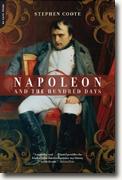Napoleon & the Hundred Days
Stephen Coote
book reviews:
· general fiction
· chick lit/romance
· sci-fi/fantasy
· graphic novels
· nonfiction
· audio books
· author interviews
· children's books @
curledupkids.com
· DVD reviews @
curledupdvd.com
newsletter
win books
buy online
links
home
for authors
& publishers
for reviewers

 |
Napoleon & the Hundred Days Stephen Coote Da Capo Press Paperback 320 pages January 2007 |
|
Napoleon & the Hundred Days
Hundred Days The story begins with Charles Maurice de Talleygrand, President of the Provisional Government after Napoleonís exile. Talleygrand isnít a key figure in the story, more a means for the text to begin. When he finds out that Napoleon has escaped his exile on the island of Elba, it sets the stage for the final hundred days of power for Napoleon. A brief interlude on Napoleonís actions since his early years demonstrates that at an early age, Napoleon showed talent on the battlefield. A highlight of the text says it best: ďHis astonishing quickness of thought was equaled by a strategic intelligence that could always see a battle on a whole and by a memory so retentive that he would recall every detail of the disposition of his men and the terrain through which they were passing.ĒStill, Napoleon was a man from the lower classes and, no matter how gifted, would never realize his dream under the Bourbon kings of France. The French Revolution came and things changed. The central problem was that, when the revolution occurred, the other powers of Europe were terrified of it spreading and destroying all monarchies. Even so, a million Frenchman joined the army and would pose a problem for the combined might of the allies. Without Napoleon, though, the Republic might never have lasted long. Even when he was emperor, early on he had to be a master in every battle or risk losing all he had gained. Napoleon couldnít be everywhere; since he was a good judge of men, his seconds were able to achieve some success. Nationalism was beginning to spread throughout the countries of Europe, not just in France, and would continue to escalate until the First World War. It could be summed up by the words of the German philosopher Herder: ďLet us follow our own path, let all men speak well or ill of our nation, our literature, our language.Ē Napoleon wasnít a random occurrence, as the text relates. Instead, he was a good judge of men and the national sentiment of the French people, but after years of ruling the battlefield, Napoleon was finally defeated in 1814 and, soon after, sent to Elba. Coote brings to light information rarely told in other texts, as it would defame the Master: Napoleon, soon after his exile, attempted suicide unsuccessfully. Yet, ďhe believed he could move the world by the resolve of his own will.Ē Napoleonís attempted suicide didnít take this away from him. After leaving Elba and effectively retaking France with six hundred soldiers, Napoleon met his fate at the Battle of Waterloo, where his judgement of the battlefield appeared exhausted as he just couldnít call upon the resolve to win anymore. Coote illustrates all these details quickly, and it is easy to get lost amongst the words. He does make some minor errors in the text in terms of choosing information. Napoleonís greatest battle, Austerlitz, is given one short paragraph. The majority of the battles are given little weight in words, while things like the economic blockade of Britain are thoroughly analyzed. Choices had to be made and, perhaps, these things had been analyzed enough by other writers. Coote incorporates what is known about Napoleon into a text worthy to note. Things would never be the same in the military world after Napoleon, and Coote gives him due respect. The bibliography and notes arenít as extensive as usual histories, which suits a book written more like a novel than a history. Napoleon & the Hundred Days Originally published on Curled Up With A Good Book at www.curledup.com. © Jacob Malewitz, 2007 |
|
|
|
 Click here to learn more about this month's sponsor! |
|
| fiction · sf/f · comic books · nonfiction · audio newsletter · free book contest · buy books online review index · links · · authors & publishers reviewers |
|
| site by ELBO Computing Resources, Inc. | |
 The story of Napoleonís last days in power, from Elba to Waterloo, has been told many times, and is a difficult narrative on which to shine fresh light. Yet Coote is able to bring together the facts while at the same time embroiling readers in the true characters of the time.
The story of Napoleonís last days in power, from Elba to Waterloo, has been told many times, and is a difficult narrative on which to shine fresh light. Yet Coote is able to bring together the facts while at the same time embroiling readers in the true characters of the time.